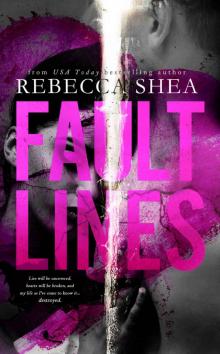- Home
- Rebecca Shea
Broken by Lies
Broken by Lies Read online
Broken by Lies
Copyright ©2015 Rebecca Shea Author, LLC
All rights reserved.
This book is a work of fiction. Any resemblance to any person, living or dead, any place, events, or occurrences, is purely coincidental. The characters and storylines are products of the author’s imagination or are used fictitiously.
Except as permitted under the U.S. Copyright Act of 1976, no part of this publication may be reproduced, distributed or transmitted in any form or by any means (electronic, mechanical, photocopying, recording or otherwise), or stored in a database or retrieval system, without the prior written permission of the author.
This ebook is licensed for your personal enjoyment only. This ebook may not be re-sold or given away to other people. If you would like to share this book with another person, please purchase an additional copy for each person. If you are reading this book and did not purchase it, or it was not purchased for your use only, then please return it and purchase your own copy. The scanning, uploading, and distribution of this book via the Internet or any other means without the written permission of the author is illegal and punishable by law. Thank you for respecting the hard work of this author.
Cover design by: Regina Wamba, Mae I Design
Edited by: Beth Lynne, Hercules Editing and Megan Hand
Formatted by: Angela McLaurin, Fictional Formats
Prologue
Chapter One
Chapter Two
Chapter Three
Chapter Four
Chapter Five
Chapter Six
Chapter Seven
Chapter Eight
Chapter Nine
Chapter Ten
Chapter Eleven
Chapter Twelve
Chapter Thirteen
Chapter Fourteen
Chapter Fifteen
Chapter Sixteen
Chapter Seventeen
Chapter Eighteen
Acknowledgements
To those who love the unlovable.
I INHALE THE fresh spring air as I start my walk home from work at the grocery store. The smell of moisture hangs in the air and small patches of snow are all that remain from the late spring snowstorm we received last week. Gravel crunches beneath my feet as I step along the shoulder of the only road that reaches from one end of this small town to the other. I live in a tiny trailer with my mom on the far edge of town. The small house sits next to White Lake, the town’s namesake. For every day of my twenty-one years, we’ve lived in this piece of shit trailer. It’s dilapidated and falling apart, but it’s all we can afford, so I don’t complain. I just make the best of our situation.
Once more, I kick at the gravel alongside the paved country road that leads to the lake and our little slice of broken-down home. It’s dark out here in the dead of night, but the moon shines so brightly that you can easily see the road. I follow the shoulder, staying on the gravel so that I’m out of the way of any cars. It’s not unusual not to see a single car pass me on the walk home. It is, however, unusual to see the flashing lights of a police car.
My heart begins to pump wildly when I see the lights turning down the gravel drive that leads to our trailer, and my feet take off in a full sprint. Stumbling a few times on the rocks, I near the trailer and hear my name being called.
“Emilia!” It’s Carter, our landlord. “Emilia!” he hollers again. It’s hard to believe anyone actually owns and rents the piece of shit trailer we live in, but he’s always been good to us—and lenient when we don’t have the rent on time.
“What’s wrong?” I ask as I approach, out of breath. My eyes scan the trailer and find the front door open and flapping in the wind.
“It’s your mom,” Carter tells me, shaking his head. “When I came to collect the rent, she didn’t answer. It’s not like her, Em.” He glances behind him at his dilapidated shack of an investment property. “The window was open, so I looked inside and, uh, saw her lying on the floor.” Carter is visibly distraught as he runs a shaky hand through his silver hair and closes his eyes briefly.
Carter has always been like a grandfather to me. He’s mild mannered but tough. Tall and strong, and nothing rattles him. Until now.
A police officer strings yellow crime scene tape around a tree, and I run straight past him as he begins yelling at me to stop. I run through the front door, and there lies my beautiful mother. On the living room floor. In a pool of blood. A black handgun sits next to her.
“No, no, no!” I scream. “Mama, no…” I gasp for air as I kneel down next to her. The blood is drying in her matted hair. It sinks into my knees, and I notice the blood has started to thicken and turn into a gel-like consistency on the floor. I pull her into my lap and hold her. I hold her and scream. I scream for her. I scream for me. I scream for how unfair life has been to us.
Sheriff Wilson runs through the front door and begs me to leave her. When I don’t leave, he orders me to leave. I still don’t. I can’t leave her; she is all I have. I press my forehead to hers and cry. My tears fall in streams, landing on her face as I try to rationalize what’s happening.
“Please, you can’t leave me. Please,” I whisper against her head.
“Emilia,” Carter says quietly as he steps into the trailer. “Come on, girl; you don’t need to be in here.”
“I have to, Carter. She needs me. I need her,” I wail. This can’t be happening to us.
“Emilia, please. Come outside and talk to Sheriff Wilson. He has some questions.”
Carter tugs on my arm, and I slide on the dingy, blood-smeared linoleum floor as I try to get up. Carter wraps an arm around my shoulder and guides me out of the trailer. My khaki pants are covered in blood, and my hands are shaking so bad I have to shove them in the pockets of my sweatshirt.
“Sheriff, this is Emilia, Carrie Adams’ daughter.”
“Ms. Adams.” The sheriff nods at me with sympathy in his eyes.
My body begins to shake so badly; I can actually feel my knees knocking together. Carter holds me against him to steady me.
The sheriff sighs sympathetically. “I’m so sorry for your loss.” He cringes when he says those words. “We’re still piecing together all of the details, but it looks like suicide. The medical examiner will have to determine that, but no foul play is suspected,” he says quietly.
“We don’t own a gun,” I mumble. Where would she get a gun? She wouldn’t shoot herself and leave me alone. She told me she was actually feeling better, that the depression that used to eat her alive was finally at bay.
“Like I said, we’ll let our crime scene technicians finish up, but the scene has been compromised.” He looks at me harshly. “Mr. Wilson, I mean, Carter said there was a gun in her hand when he arrived.”
“We didn’t have a gun,” I tell him again. “We didn’t have access to a gun. We couldn’t afford a gun. We could hardly eat. That gun in there is not ours.”
Sheriff Wilson sighs and writes in his notebook.
“Do you have any other questions for her?” Carter asks. “I think she’s in shock.”
“That’ll be all for now.”
“Emilia, sit down,” Carter says as he guides me to the large oak tree in front of our trailer. My limp body makes a loud thud when I sink to the ground. My chest feels like it’s collapsing, and the air from my lungs has vanished. My limbs are stiff and I wonder if this is what it feels like to be in shock.
Time stands still as I watch police officers come and go, and I mumble answers to their questions as best as I can. Just as the morning sun begins to rise, I finally watch them wheel my mom from our trailer on a stretcher. Her body is encased in a large white plastic bag with a zipper up the front. I cry again when they put her into the back of an old county van mar
ked “Medical Examiner,” and then they drive away. She’s gone. I’ll never see her again, hug her again, or tell her I love her again.
I wipe at the tears as I curse the disease I believe took my mom. She has suffered from debilitating depression since the day my dad left, which was the day he found out she was pregnant with me. It was three days before she graduated from high school and gave up her dreams of going to college to raise me. She’d wanted to be a nurse. She might’ve been a good one. I’ve always felt a sense of guilt that I was the reason her life fell apart and that her dreams were shattered in order to raise me. However, the reality is that I pretty much raised her. For as long as I can remember, I was the one responsible for cooking, doing the laundry, and cleaning. I never knew the woman she claimed she used to be—fun and happy-go-lucky.
While she was never the perfect mother, she did her best raising me and insisted I do well in school. I’ve always been a straight A student, something I’ve prided myself on.
I glance down the drive and can almost see her standing there. In elementary school, she’d walk the quarter of a mile to the edge of the property every morning and wait with me for the bus to pick me up. And the afternoons that she wasn’t asleep, lost in her depression, I’d find her waiting when the bus dropped me off. Those afternoons were few and far between, but I used to love seeing her waiting for me. Those were my happiest memories of her. Those days meant one thing—her depression was at bay, if only for a few hours.
Carter’s voice pulls me from my memories. “I don’t want you to go inside that trailer again, Emilia,” he says quietly as he walks toward me. He has sat next to me for the last few hours, only leaving for a few minutes when they were unrolling the caution tape that now surrounds the trailer. “They’ve given me permission to get a few items from the bedroom for you while they finish up inside. You can stay in the spare bedroom at our place. I called Eve to let her know.”
“What’re they doing in there?” I manage to ask, my voice hoarse. My body is stiff and my head rests against the rough bark of the oak tree, the cool morning air pricking at my skin.
His hands are shoved in his front pockets as he looks down at me. “Just tell me what I can get for you,” he sighs.
I quietly rattle off a small list of things, knowing they’ll all fit into one shoulder bag. Carter disappears and is beside me a few minutes later. Or maybe it was an hour. Time bleeds together right now.
He tosses my bag in the back of his pick-up truck. “Let’s go, Emilia,” he says softly.
I glance up and stare at the rusty tin trailer, lost in a state of shock and denial. This broken down thing, as much as I’ve despised it, is the only home I’ve ever known. And mixed with my grief is a sharp panic—what will happen to me and where I will go? What is my life now?
“I’m going to sit here for a while,” I mutter. “I need to be alone. I’ll be over in a bit.”
“Come straight to the house,” he says firmly. “If you’re not there in an hour, I’m coming back. And, Emilia, don’t go back inside that trailer.”
I just nod.
He hesitates before climbing into his pick-up truck and leaving, a trail of dust following his old truck down the gravel road. Within a few minutes, everyone is finally gone, leaving me sitting against this oak tree. Realization finally sets in…
I am truly alone.
I FEEL LIKE I’ve entered an oven as I step off the Greyhound bus. The Phoenix heat scorches my lungs and stings my eyes. It’s nine o’clock in the evening; I can’t imagine what it’s like during the day when the sun is out. I stop on the sidewalk, trying to get my bearings, and I’m bumped from behind by a large man that grunts at me and forcefully nudges me out of his way. Palm trees line the city street in front of me, and there is a small line of taxis parked in front of the dimly lit station. With the little money I have, I know I’ll be taking a city bus and not a taxi.
I run my finger over the scribbled address on the crumpled paper before tucking it safely back into my pocket. With no plan and no idea where I’m staying tonight, I stand in line at the one open window at the ticket counter. A light sheen of sweat blankets my face, and I’m thinking that wearing jeans on a thirty-nine-hour bus ride to Phoenix in the middle of June probably wasn’t the best idea. I’m sticky and uncomfortable and just want a shower and sleep.
The man in front of me steps away from the window, and I approach nervously. The woman behind the counter is old and short, wearing thick eyeglasses and a pair of pants that are about two sizes smaller than she needs. She doesn’t make eye contact with me, but barks questions and commands in her raspy smoker’s voice. “Next. Step up. Where’re you goin’?”
She punches the keys on the dirty keyboard in front of her. I clear my throat and step closer so she can hear me. “I don’t know.” My voice is weak, timid.
“Well, how can I help you if you don’t know where you’re going?” Her tone is condescending. She looks up from her keyboard and meets my eyes indifferently.
“I just got off that bus.” I point toward the oversized silver bus that is sitting at the curb. “I’m staying here in Phoenix, but I just need a recommendation for a safe place to stay that’s in my price range.”
Her shoulders fall, and an audible sighs escapes her mouth as she studies me. “Anything affordable isn’t going to be safe,” she grumbles. “Where are you from?”
“White Lake, Illinois.”
“Figures,” she mumbles under her breath as she looks me up and down from head to toe before typing away on her keyboard again. “Look, I don’t know what your budget is, but here’s a list of motels that start at thirty a night and go up to a hundred. Stay off of Van Buren, girl; they’d eat you alive over there.” She chuckles to herself and shoves three pieces of paper at me under the slat in the glass window.
“Thank you.” I smile at her politely and take the papers. Standing underneath the street light, I sort through them, then move toward the bus stop with the one bag I brought. It holds three changes of clothes, a notebook, three books, and my wallet. That’s all I own. The few items I left behind were of little to no value to me and would’ve been more weight to worry about.
I sit nervously on the scorching metal bench and wait, adrenaline coursing through me. Using the large map on the side of the bus shelter, I mentally jot down the three buses it’ll take to get me to the strip of motels that hopefully will have a cheap room available for a few days. When the bus pulls up to the curb, I get on and deposit my money before taking a seat in the middle of the mostly empty space.
Public transportation is alike in most cities, as well as the people who ride it—you can see the exhaustion written across their faces. I lean my head against the window and focus on the passing cars and businesses as we snake through the dark streets of Phoenix. An hour and two transfers later, I arrive at my final stop. Pulling the straps of my bag onto my shoulder, I step off and out onto the dark street.
I can see the signs for the motels just ahead, about two and a half blocks away. Walking briskly toward the bright signs, I keep my eyes glued to my destination. A bed and a shower are so close that I can almost feel my sore muscles begin to relax. The motels are just off a major interstate and sit along a service road. There’s a lot of traffic, which makes me more comfortable in this foreign city. As the lights get closer, I finally step off the sidewalk and across the black asphalt parking lot toward the small building. A neon light flashes the word “office,” and I increase my speed, jetting through the parked cars. Even in the evening you can feel the summer heat penetrating the surface of the blacktop, right through my sandals. I wriggle my toes against the thin soles of my shoes.
When I push the glass door open, I’m greeted with a blast of cool air. For the first time in an hour, I feel like I can breathe and my lungs respond with a deep inhale. I take a couple of deep breaths, then tilt my face up toward the air conditioning vent in the ceiling, hoping it dries the sweat on my face.
“Can I help
you?” an older man with gray hair asks as he steps out from behind a closed door.
I startle. “Hi. Um. Yes. I need a room for a couple of nights.”
“Two?” He takes me in, glancing over the rim of his glasses before looking back to his computer.
“Yes, just two nights for now, please.”
“You from around here?” he inquires.
“No.” I swallow. “Illinois.”
“I’ll need your license and credit card.”
“I have a picture ID and cash.” Please let that be enough. I can’t imagine trying to find another place now. I reach into my bag to pull out my wallet.
He pauses and looks over the counter at me. “We don’t do cash business here. I’ve been working real hard to clean this place up.” He pauses and looks me over again.
“I don’t have a credit card,” I stutter, as panic sets in.
He exhales loudly and stares at me, his eyes becoming sympathetic. “For cash, it’ll be one hundred and fifty dollars.”
I swallow hard. All I have is two hundred dollars and that won’t get me back to Illinois if things don’t go well here. “Uh…” I turn and look out the large glass windows to the motel next door, the vacancy sign flashing bright in the dark. I wonder if it’s any cheaper. It’s rundown and dingy—more so than this Motel 6, and it’s getting late. I fidget nervously, trying to make up my mind.
“Okay.” I turn back and smile at him. I pull the cash from my wallet, count out the one hundred fifty, and slide it across the counter.
He prints me out a receipt that I shove in my bag and slides a key card across the counter. “I don’t want any trouble here. You look like a good girl. Go to your room and stay there,” he says, and retreats back behind the closed door he had come from just a few minutes earlier.
A sticky note stuck to the front of the keycard states that I’m in room one hundred forty-three. I pull the straps from my bag a little higher on my shoulder and step back out into the hot, heavy air. Following the sidewalk that winds around the parking lot, I walk briskly as the numbers on the doors ascend.

 Broken by Lies
Broken by Lies Fault Lines
Fault Lines Bound by Lies
Bound by Lies Unforgiven
Unforgiven Unbreakable
Unbreakable Betrayed by Lies
Betrayed by Lies Undone
Undone